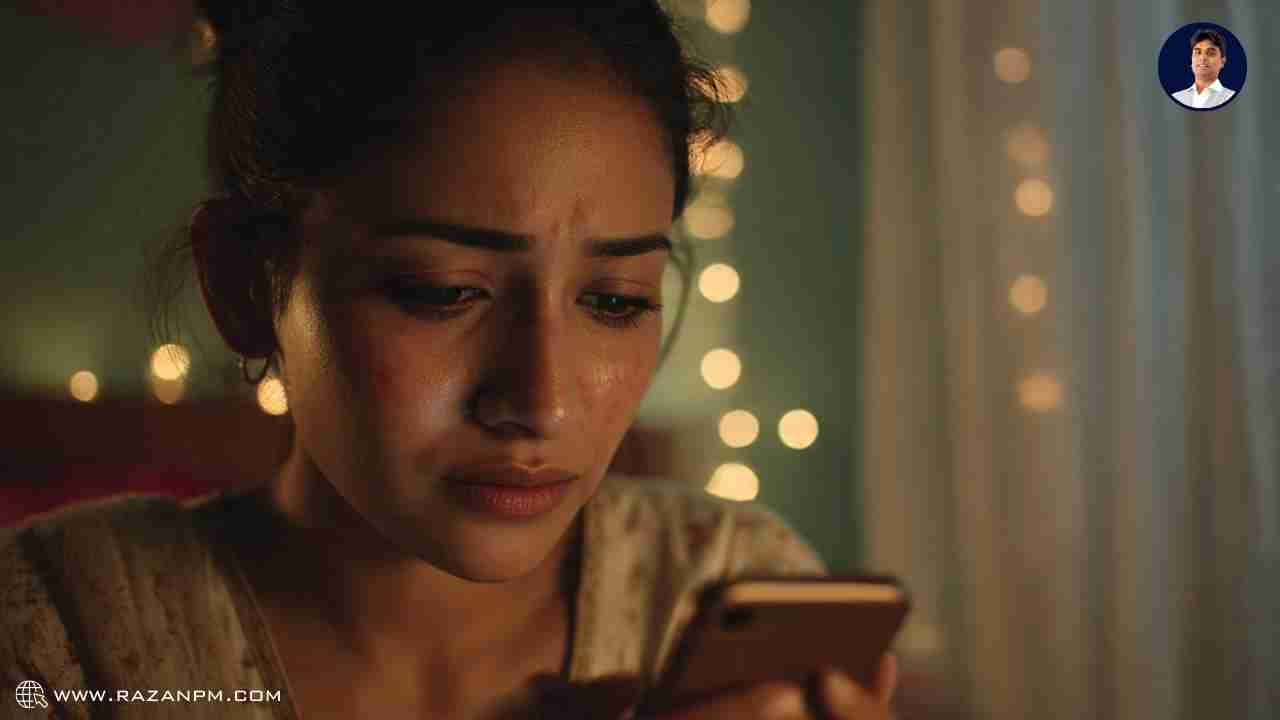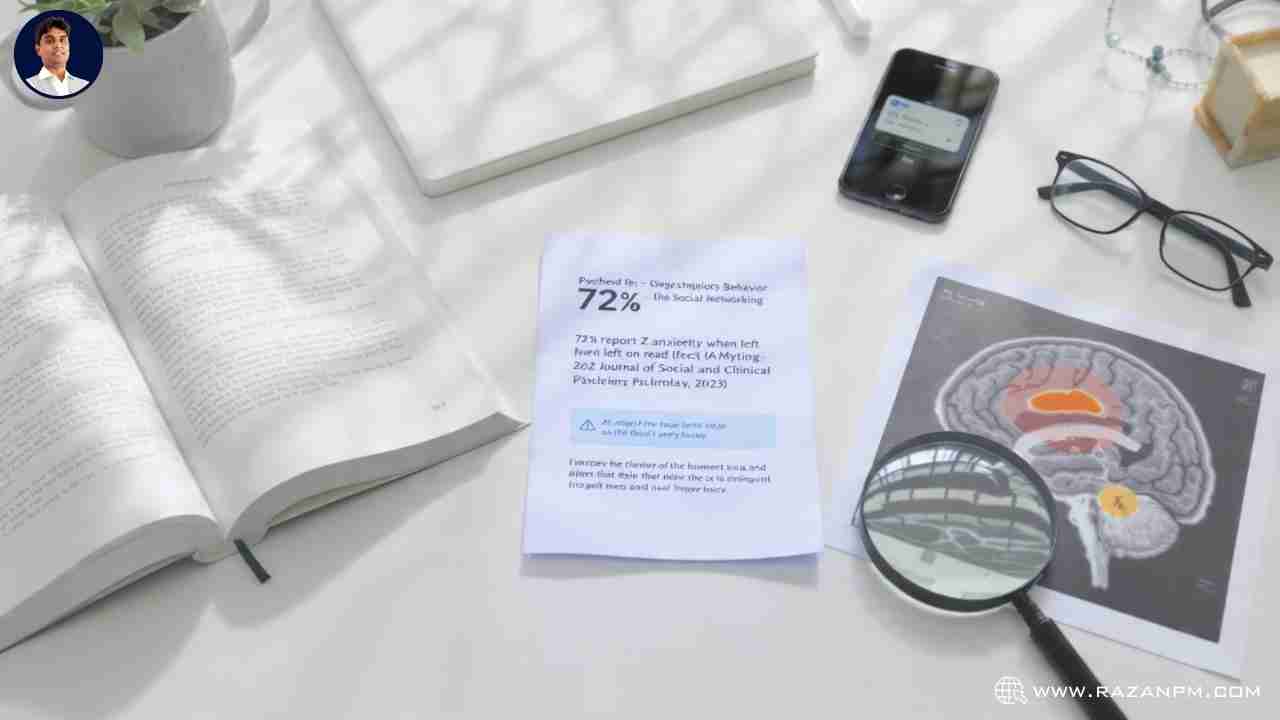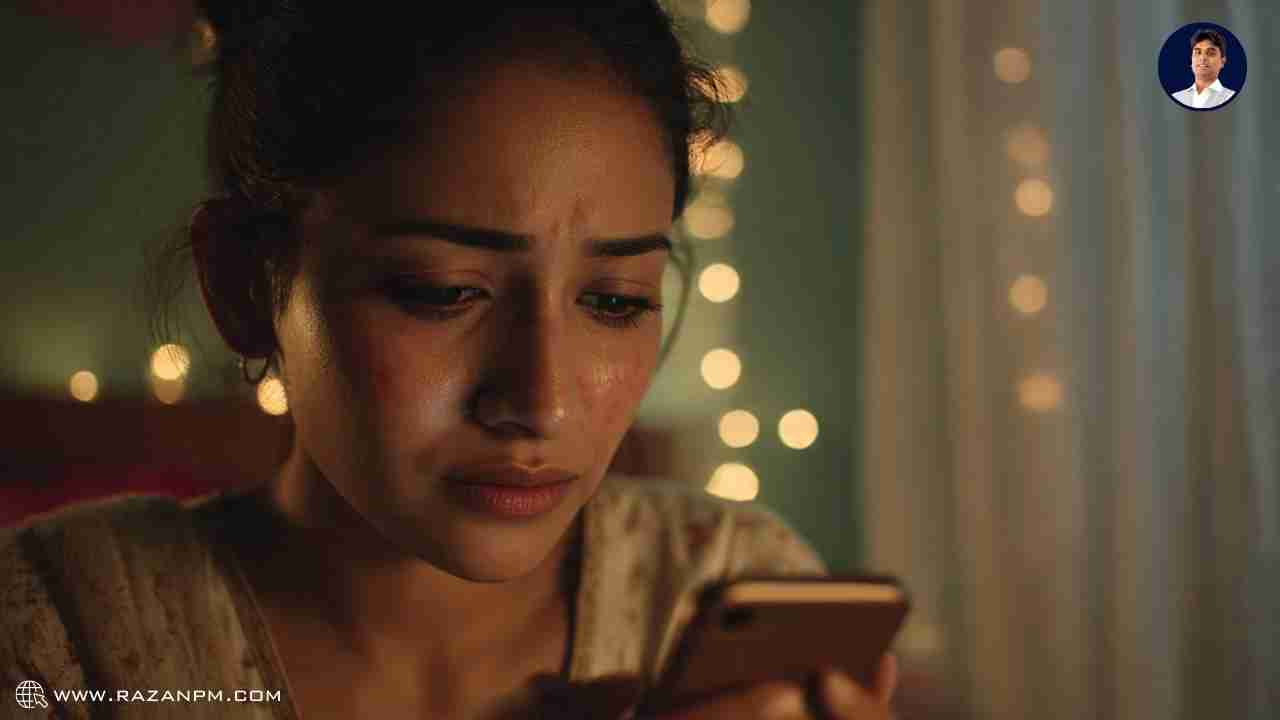You ever send a long heartfelt message to someone — maybe a “Hey, I really needed to talk…” — and then… nothing. Just those two blue ticks. The silence screams louder than any reply.
We tell ourselves, “Maybe they’re busy,” but 2 hours later — the brain whispers, “They’re ignoring you… they don’t care.”
And suddenly, what started as a small moment turns into emotional chaos — anxiety, self-doubt, and endless scrolling through old chats trying to find “where it went wrong.”
Funny thing? It’s just a message. But emotionally, it feels like rejection — digital heartbreak.
also read: how disorders like insomnia fueldepression?

Being left on read has become the new-age rejection.
You didn’t get ghosted, you didn’t get blocked — yet, it feels like both.
Our mind starts writing stories:
In therapy sessions, I often see clients say, “It’s silly, but I just can’t stop thinking about that one message.”
Trust me — it’s not silly. It’s psychologically valid.
also read: how isolation triggers illness anddepression together?
Let’s be honest — we’ve all been there.
When someone doesn’t reply, our brain doesn’t see “delay.” It sees rejection.
That one blue tick becomes proof that we’re “not important enough.”
You check their status, their online activity — maybe they posted a story but didn’t reply to you.
And suddenly, self-esteem dips, anxiety rises, and your mood crashes.
You replay the chat 20 times, over-analyzing every emoji and punctuation mark.
The loop continues — overthinking, self-blame, fear of losing connection.
In clinical terms, this is a form of social anxiety triggered by perceived social rejection.
But emotionally, it’s just plain painful.
also read: how to stop the cycle of pain anddepression

Here’s how you can tell if this pattern might be affecting your mental peace:
✅ Overthinking – You replay the conversation repeatedly to find “what went wrong.”
✅ Sleep disturbance – You can’t rest because your mind is waiting for that one reply.
✅ Mood swings – You feel low, irritated, or sad after being ignored online.
✅ Validation seeking – You keep checking if they’ve read or replied.
✅ Self-blame – You assume it’s your fault without any evidence.
✅ Compulsive checking – You keep reopening the chat to see if they’re online.
If you related to even a few, it’s a gentle sign that your emotional regulation might be getting hijacked by digital triggers.
also read: what to do when i love you gets noreply
Now let’s look at it scientifically —
In DSM-5 (Diagnostic and Statistical Manual of Mental Disorders), the experience of being left on read connects with symptoms from conditions like:
In ICD-11, this behavior aligns with “adjustment reactions” and “mixed anxiety-depressive responses” — when emotional responses are disproportionate to minor events.
In simpler words — it’s not just about a message. It’s about how your mind interprets silence.
Your brain’s threat system — specifically the amygdala — goes on high alert, interpreting “no reply” as danger.
And that’s why your fight-or-flight mode kicks in — heart races, thoughts spiral, emotions crash.
also read: how fear of rejection kills realconnection?

Studies have confirmed how digital communication patterns directly impact mental health.
So no, it’s not “just overthinking.” It’s a real neuro-emotional response.
also read: why timing turns simple talks intobig arguments?
I’ll never forget a young client I’ll call Riya.
She came to me with sleepless nights, panic, and a phone she couldn’t stop staring at.
Her partner had started replying less, leaving her messages seen but unanswered.
She said, “It feels like I don’t exist when they don’t reply.”
As she spoke, tears flowed — not because of one unread message, but because it reminded her of every time she felt unseen in life — by parents, by friends, by loved ones.
That’s when it hit me deeply — “Left on read” anxiety isn’t about the phone. It’s about connection, validation, and worth.
We don’t crave the message; we crave the feeling of mattering.
Working with Riya, we started exploring her attachment patterns, her need for reassurance, and slowly built emotional independence.
Weeks later, she smiled and said, “He didn’t reply for two days… and I didn’t spiral.”
That’s not just healing — that’s freedom.
also read: how everyday pressure breaks yourmind?

Here’s a small but powerful exercise I give my clients (and you can try right now):
Step 1: Awareness
The moment you realize you’re waiting for a reply — pause. Acknowledge the feeling:
“I feel ignored, and that makes me anxious.”
Step 2: Grounding
Breathe deeply. Place your hand on your heart and say:
“Their reply doesn’t define my worth.”
Step 3: Redirect
Do something nurturing offline — take a short walk, journal your thoughts, or text a friend you feel safe with.
Step 4: Perspective Reset
Remind yourself: People get busy. Silence doesn’t always mean rejection.
This simple technique helps your brain shift from emotional reactivity to emotional regulation.
It trains your nervous system to detach from digital validation and anchor back to self-worth.
also read: do voice notes kill realconversations?
What I’ve shared today is just the first layer.
The deeper healing comes when you start understanding your attachment style, emotional patterns, and self-worth triggers at their roots.
In therapy, we don’t just talk about being left on read — we explore why it hurts so much.
Because behind every unread message lies an untold story of needing to feel enough.
If you’re nodding while reading this — maybe it’s time to talk.
You don’t have to overthink messages, replay chats, or battle silent anxiety alone.
Healing is possible.
I’ve seen countless clients reclaim peace, confidence, and self-trust — one mindful conversation at a time.
also read: how bias turns into deep depression?
💬 If this feels familiar, you don’t have to figure it out alone.
👉 Book your consultation here — and let’s heal your digital anxiety together.
Because your worth is not measured by someone’s reply — it’s measured by how gently you hold yourself when silence happens.
👉 Begin Your Journey with a 1 on 1 Consultation
👉 Begin Your Journey with a 1 on 1 Consultation

In psychology, being left on read can trigger feelings of rejection, anxiety, or low self-worth. It’s often linked to social anxiety or attachment insecurity, where the brain interprets “no reply” as social disconnection.
also read: how to tell if emotional separationhas already started?
Overthinking happens because your brain’s threat system activates when it senses rejection. This emotional response is natural, especially if you’ve experienced emotional neglect or abandonment in the past.
also read: why kind words create misunderstanding?
Yes! Research shows digital rejection can activate the same brain areas as physical pain. So, that emotional sting you feel is scientifically valid — it’s not “overreacting,” it’s your brain’s way of processing emotional pain.
also read: how caregiving triggers hidden depression?
Try grounding techniques like deep breathing, journaling, or self-affirmations. Remind yourself: their silence doesn’t define your worth. Shifting focus to self-care helps reduce emotional dependency on external responses.
also read: how fibromyalgia fuels hiddendepression?
Absolutely. Constant worry about replies or online behavior can lead to digital anxiety, low self-esteem, and mood swings. Over time, it may reinforce negative thought loops if not addressed.
also read: why saying i love you is not enough?
If your mood, confidence, or sleep are affected, or if it’s impacting your relationships, it’s time to talk to a Govt.Recognized Counsellor & Mind Healer. Therapy helps you uncover the deeper emotional triggers behind the anxiety.
also read: why emotional intimacy feels unsafefor some partners?
Yes, it’s completely human. Social connection is a basic emotional need. Feeling hurt when ignored online shows that you value relationships — but learning emotional regulation ensures you don’t lose peace over digital silence.
also read: how hormonal shifts can triggerdepression?
